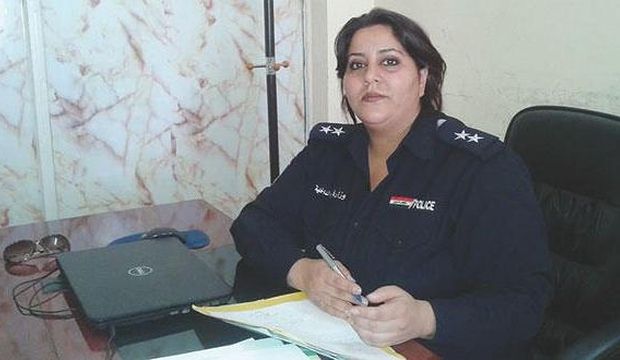
First Lt. Rasha Al-Tayar, Baghdad’s only female police officer, sits at her desk in her office at a police station in Baghdad, Iraq on September 8, 2014. (Asharq Al-Awsat)
Baghdad, Asharq Al-Awsat—First Lt. Rasha Al-Tayar, the only policewoman in the Iraqi capital of Baghdad, doesn’t hide her delight at people being shocked seeing her on her way to work every day. “At first, people were astonished when they saw me in my military uniform. Now I see it as part of my job,” she tells Asharq Al-Awsat.
Tayar admits her career is not an easy one, requiring immense strength under pressure, particularly at a time when the Islamic State of Iraq and Syria (ISIS) is threating the country, causing military personnel to become a greater target than usual. But Tayar opposes the negative view in Iraqi society of women taking on such roles.
In speaking to Asharq Al-Awsat, Tayar was demonstrating her belief in the necessity of the media—she was previously a journalist herself after graduating from Baghdad’s College of Mass Communication in 2000—but refused to answer some questions as a safety precaution. Baghdad is, after all, a target of daily terrorist attacks.
Tayar says she was first interested in becoming a journalist because of the courage the profession required. “I pursued a media career in several outlets after my graduation. In 2009, I joined the Ministry of Interior to work in the Media Department,” she says.
But her career took a different path after she heard about Iraq’s first police training course for women. “I liked the strange and ambiguous nature of the idea, and decided to enroll in the course,” says Tayar, who was among the first group of policewomen in Iraq. She adds: “My husband and family encouraged me as my father was an aviation officer.”
Tayar believes there are similarities between journalism and her role as a police officer. “In both careers my job is to investigate and try to uncover the truth in any case,” she says.
Tayar became the sole media representative among 50 policewomen from different Iraqi provinces. She later enrolled on a nine-month course to facilitate her promotion to the rank of second lieutenant. Afterwards, she took a public relations and media officer role, coordinating conferences, and writing articles and reports in the ministry’s Police Affairs magazine. Later on, however, she felt she should resume her job as a police officer. Now at her police station in Baghdad, she receives dozens of criminal and civil cases every day.
But she still faces numerous difficulties regarding the attitudes some people, and even some of her colleagues, have regarding women in the profession. Some men under Tayar’s command are even reluctant to salute her. “As for calling me ‘sir’ in accordance with my . . . title, most men hate saying it to women. But, it was agreed that my title is ‘First Lt. Rasha’ and that the salute should be given to me,” she says, adding that she remembers when the previous regime gave policewomen a “salute allowance.”
Defendants are often surprised to find themselves in front of a female investigator, Tayar explains. Sometimes they enter her office enquiring after a “First Lt. Rashad.” Tayar says she responds to this usually daily occurrence with: “I am First Lt. Rasha, not Rashad, and I will be conducting the investigation with you.”
Tayar used to travel to work in civilian clothes, changing into her uniform at her office. But she says she grew tired of disguising herself and started leaving for work in her military outfit so people could get used to seeing her in it. When asked about her personal safety when not carrying a weapon to protect herself, she says: “We are all vulnerable to danger, but I feel that no one bears malice or rancor towards me. God will protect me.”
During her journalism career, for which she admits she is sometimes nostalgic, Tayar received the Innovation Shield from the Police Integrity Commission for the best investigative report into police corruption in preventing prostitution in the Al-Bataween district in 2010. The report was published in a magazine issued by the Ministry of Interior.
In her role of first lieutenant, Tayar advises other women who are thinking about joining the police force. She previously lectured at a police training center in front of 500 women from various Iraqi provinces, and is proud this was the largest group of students to go on and become police officers. In Tayar’s opinion, a policewoman must be courageous and strong; she advises that only brave women enter the force. “This career is a respectful one in which you should seek to gain others’ respect by behaving respectfully and exhibiting a commitment to discipline,” she says.
Iraqi society is, however, still averse to seeing women in this profession. Until recently, there were attempts to assign female police officers only to frisking jobs. Tayar says: “We are a conservative society in which only women can frisk other women before they are given access to sensitive government circles. However, policewomen proved their proficiency in undertaking tasks that used to be purely the province of men.”
She adds: “There are those who claim such tasks could strip women of their femininity. This isn’t true, as exemplified by the large number of beautiful and elegant policewomen and women investigators across the world.”
Rasha emphasizes her ambition to take her career forward. But for now she is anticipating her promotion to the rank of captain early next year. With more women like her in the profession, eventually the only people causing difficulties for Iraqi policewomen should be just the criminals—and not the public they are sworn to protect.
